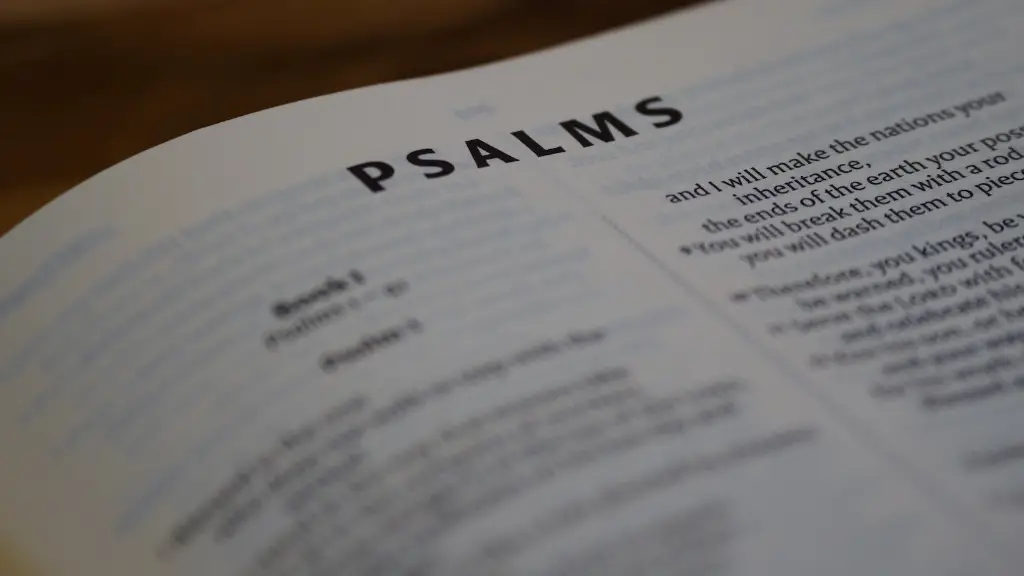Jezebel is a fascinating, yet controversial character in the Bible. She has been seen as both a villainous queen, and a model of female determination. Jezebel is often used as a symbol to represent a person who acts in a manipulative and deceitful manner. In the book of 1 Kings, she is presented as a wicked queen who led the idolatry of Baal and Asherah in the northern kingdom of Israel. Her story is intriguing, yet her legacy remains largely misunderstood.
Jezebel was born into the Sidonian royal family and at the time Israel and her kingdom were in a state of war. She married King Ahab, the ruler of Israel, in a union between two rival nations. The union was meant to bring an end to the war and instead, she brought her own form of worship to Israel, which included sacrificing to other gods such as Baal and Asherah. This was condemned by the prophet Elijah and sparked a power struggle between Ahab and himself. As a result, Ahab bowed to her influence and allowed the worship of other gods to continue, a decision which greatly angered God.
It wasn’t long before Jezebel’s influence spread throughout the kingdom. She had an active role in influencing and shaping Ahab’s decisions, even becoming known as the main instigator of the massacre of the prophets in an attempt to eradicate any opposition to her belief system. She even tried to have Elijah killed after he tried to warn Ahab of her wicked ways. Even after her death, Jezebel was remembered for her wickedness and the phrase “Jezebelic” was used to refer to someone of ill-repute.
Unlike some of the other characters in the Bible, Jezebel has been seen as both a villain and a heroine depending on who is viewing her. Some believe that she was a powerful and determined female figure who refused to bow down to the pressure of male authority. She was determined to practice her own beliefs in a time of immense cultural, political, and religious differences. Many have used her story as a symbol of female independence and power in a patriarchal world. On the other hand, her influence over Ahab was seen as a negative, as it brought an end to a potential opportunity for peace. Additionally, her wicked acts led to the death of many innocent people, which is why she is seen as a villain by many.
Though Jezebel is seen as a symbol of wickedness and womanhood, her story is filled with complexities and many experts believe that her actions were reflective of the time and place. Nevertheless, she remains a controversial figure in the Bible and her legacy remains to be debated.
Jezebel’s Marrridge to King Ahab
Jezebel married King Ahab in a power move, in hope to join the two warring nations and bring peace. The prophet Elijah condemned the union, warning Ahab of impending doom if the union was maintained. The union is seen as the climatic moment in their stories, as it sparked a power struggle between Ahab and himself. This led to Ahab bowing to Jezebel’s influence and allowing the worship of other gods to continue, a decision which ultimately angered God.
Though marriage for power was frowned upon by the Israelites, it was a common practice amongst other nations of the time. Therefore, some believe that there is a more nuanced story behind Jezebel’s decision to marry Ahab. By marrying him she was able to bring her beliefs and her own form of polytheistic worship with her,and some even suggest that she was hoping to bring an end to the war between both nations, thereby enacting a kind of peace.
Ahab was described as being submissive to her, however, it is unclear whether this was because he genuinely cared for Jezebel or if it was simply due to the principle of “saving face” as a man of authority. Whatever the reason, it follows a pattern of male submission to female leadership that existed in Sidonian culture, and was a pattern that would have seemed unusual to the Israelites at the time.
The union between Jezebel and Ahab is mentioned in 1 Kings, but the actual events are left to be interpreted by the reader. It is ultimately up to the reader to decide if Jezebel’s motives were pure or if she was truly a wicked queen.
Jezebel’s Worship of Baal And Asherah
When Jezebel joined Ahab as his wife, she brought with her the worship of Baal and Asherah. She established altars, temples, and other shrines for their worship and allowed for the spread of polytheistic rituals, defying the strict rules of monotheism practiced by the Israelites at the time.
This form of idolatry, however, was not invented by Jezebel. Baal and Asherah were worshipped long before her arrival in Israel and polytheism was a common religious practice throughout the Middle East. Jezebel was not the only figure who promoted this type of idolatry, however, it was her presence as a powerful female leader that made it so unpopular with the people of Israel.
Though her influence was condemned by the prophet Elijah, Jezebel’s worship of Baal and Asherah sparked an important moment in religious history. It was seen as a symbolic representation of the struggle between monotheism and polytheism, and ultimately served as a reminder of the power of single-minded faith and the detrimental consequences of idolatry.
Today, Jezebel’s worship of other gods is still seen as a condemnation of idolatry and as a reminder of the need for a single-minded faith and devotion to God. It also serves as a reminder of the power of single-minded faith and the strength of religious conviction in the face of opposition.
The Legacy of Jezebel
Jezebel is often remembered as a wicked queen in the Bible and her legacy remains largely misunderstood. She is seen as a powerful, determined female figure who refused to bow down to male authority. On the other hand, her influence over her husband, Ahab, is seen as a corruption of his power.
In popular culture, the phrase “Jezebelic” is often used to refer to a person of ill-repute. Jezebel has also become a popular figure in media, with many books, movies, and TV shows based on her story. Although her story is seen as controversial, her legacy remains an important part of religious history and serves as a reminder of both the strength of faith and the dangers of idolatry.
Jezebel’s decisions and actions can be seen as both positive and negative, depending on the perspective. Nevertheless, she remains an intriguing, yet controversial character in the Bible and her legacy serves as a reminder of the complexities of faith and religion.
Jezebel’s Influence On Ahab
Jezebel was known to have had a great influence over her husband, Ahab. She was seen as the main instigator of the massacre of the prophets, and even tried to have Elijah killed after he tried to warn Ahab of her wickedness. By having control over Ahab, she was able to shape the events of their kingdom, standing firm on her beliefs and refusing to bow down to the pressure of male authority.
Ahab was known to be submissive to Jezebel’s demands and succumb to her influence, but it is unclear whether this was out of genuine care for her or out of principle. Whatever the reason, Ahab’s submission to Jezebel has been seen as a condemnation of male authority, and as a reminder to not allow one’s beliefs to be completely swayed by someone else’s.
What is clear is that Jezebel’s influence over Ahab had a large impact on the course of their kingdom and ultimately, their legacy. It is a reminder of the power of determined faith and of the importance of having a strong sense of self in the face of opposition.
Jezebel as a Symbol
Jezebel is often used as a symbol to represent a person who acts in a manipulative and deceitful manner. The phrase “Jezebelic” is often used to refer to someone of ill-repute and her story has been used to warn against the dangers of idolatry and so-called ‘evil’ female power. This is why Jezebel is often seen as a villain in the Bible, but she is also seen as a heroine for her firm stand and refusal to bow down to male authority.
Her story has been seen as a symbol of female independence and power in a patriarchal world and to some, she is a reminder of the need to stay true to one’s beliefs and convictions in the face of opposition. Jezebel remains an intriguing and controversial figure in the Bible and her legacy is an important reminder of both the power of faith and the consequences of idolatry.
Jezebel’s Story In Modern Culture
In modern culture, Jezebel has become a popular figure in media. Many books, movies and TV shows have been based on her story and she is seen as a symbol of strength, courage, and defiance. Her refusal to bow down to male authority has been seen as an important message for today’s society and her legacy has been used to inspire women to be unafraid to stand their ground and fight for what they believe in.
Jezebel has also been used as an example to educate people on the consequences of idolatry and on the danger of allowing one’s beliefs to be swayed by someone else’s. Her story has been seen as a reminder of the importance of having a strong sense of self and of staying true to one’s beliefs in the face of opposition.
Jezebel is a fascinating and controversial figure in the Bible and her legacy remains to be debated. Her story has been seen as both a warning against the dangers of idolatry and a symbol of female strength, courage, and determination. Although her story may be seen as controversial, her legacy serves as a reminder of both the power of faith and the strength of determination.





